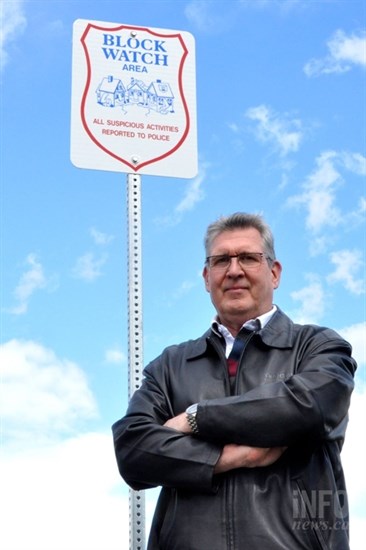
Brian Jamieson, a Block Watch captain in West Kelowna, says more people would benefit from starting a Block Watch in their own neighbourhood.
(JOHN MCDONALD / iNFOnews.ca)
April 08, 2015 - 10:29 AM
CENTRAL OKANAGAN - In a world where social media provides almost instantaneous connections, an anti-crime program that relies on email and the telephone for neighbours to stay connected seems almost anachronistic.
But that’s the model the Block Watch program still uses in British Columbia and local crime prevention coordinator Duane MacTavish says it is doing just fine, even without incorporating Facebook or Twitter.
“Your neighbour is still your best alarm system,” says MacTavish, a former detective with the Edmonton Police Service. “They are the eyes and ears of any neighbourhood."
He describes Block Watch as a complaint-based crime prevention program that connects small groups of neighbours, preferably from 10 to 25 houses, then educates them on crime prevention tactics, marking their property for identification, incident reporting and target-hardening their homes.
If someone expresses an interest in Block Watch, MacTavish will contact them and arrange an orientation. The neighbours are asked to elect a Block Watch captain, who must pass security clearance with local law enforcement.
“Once approved, the captain takes on the responsibility of going door-to-door to sign up the other participants,” says MacTavish, who adds they are usually well received. Once established, the Block Watch captain is the second person a neighbour would contact should they suspect criminal activity. The first is the RCMP.
That process itself can sometimes help weed out the criminal element in the neighbourhood, he says.
“If you know your neighbours are banding together and watching out for each other, how are you going to do your business?” he says. “Sometimes that’s enough for them to move on.”
Block Watch rose from the ashes of the Neighbourhood Watch program, which used small teams to watch large neighbourhoods. MacTavish says that had one big flaw.
“It didn’t connect people the same way. Crime feeds on isolation,” he says. “This encourages people to get to know their neighbours and their habits and patterns."
The neighbourhoods where Block Watch is established are varied, but the reasons for joining up are usually pretty similar, MacTavish says.
“There’s 23 Block Watch programs in the (Central Okanagan) regional district. There's usually only two reasons why people want Block Watch in their neighbourhood,” he adds. “People in the neighbourhood have had a rash of break-and-enters or someone says let’s get Block Watch because it works.”
If that isn’t enough, MacTavish adds a third.
“You can reduce your house insurance premiums, even if there’s not a huge amount of crime in the area,” he says.
That third reason was what attracted Brian Jamieson, a Block Watch captain who lives in the shadow of Mount Boucherie in West Kelowna.
“I have to say the reason was we found out from our insurance company that we could get a reduction if we were part of Block Watch,” he says.
His block is actually a long street, where he managed to sign up 18 of his neighbours. “It’s a pretty quiet street so, thankfully, there there hasn’t been much activity,” says Brian.
Still, besides enjoying a break on his house insurance, Brian say he now knows his neighbours in a way he never did before.
“It’s a great opportunity to get to know the neighbours. It breaks down the barriers,” he says. “Everyone is more aware of what is happening around them. I think a lot more people should invest in the program."
As for the ubiquitous Block Watch street signs, Brian says he thinks people do notice them.
“I think the bad guys notice them and I know people have said the feel more secure when they drive down the street,” he adds.
To contact the reporter for this story, email John McDonald at jmcdonald@infotelnews.ca or call 250-808-0143. To contact the editor, email mjones@infotelnews.ca or call 250-718-2724.
News from © iNFOnews, 2015